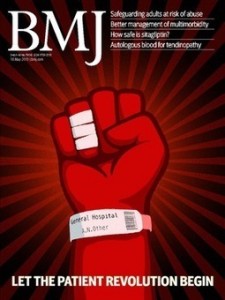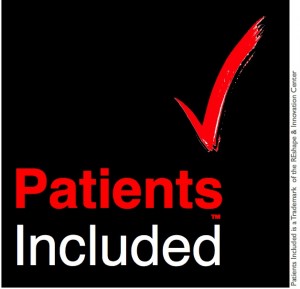This is a call for patient participation. We’re especially inviting members of our Society, but it’s open to anyone; feel free to circulate widely, especially to people with the conditions listed below!
First, a bit of background, then the request.
Regular readers know that the BMJ (formerly the British Medical Journal) is far and away the most participatory of all medical journals; it’s the global-level journal that has made important declarations about its patient partnership, and is genuinely doing the work. Click the image at left to visit their page, but in short, here are some of the remarkable things they’re doing to make healthcare – and their journal – truly see things from the patient’s perspective.
 In May 2013 they published Let the Patient Revolution Begin (see the issue cover at right), and in 2014 they got specific: they announced these steps, among other things:
In May 2013 they published Let the Patient Revolution Begin (see the issue cover at right), and in 2014 they got specific: they announced these steps, among other things:
- A patient advisory panel (I’m on it)… and the editors actually ask us about policies and listen, like real peers(!)
- Other SPM members on the panel include Glyn Elwyn, Sara Riggare, and former board member Larry Chu (head of MedicineX)
- When authors of research papers upload an article, to ask for publication, they’re asked how they involved patients in selecting the research question, what outcomes to measure, even the design of the study(!)
- The answers are published along with the article. Isn’t that amazing?
- Here’s the juicy part: patients (with no medical degree) can act as peer reviewers for articles about their disease! Yes, selected patients can be among the reviewers of a submitted article, saying “This is great!” or “Wait, what about this??”, exactly like the other docs and researchers who review the paper. [Edit: If you think “what could I have to offer, a mere patient??” see this comment below by SPM member Carolyn Thomas, who not only jumped in, she’s even blogged about the experience on the BMJ website!]
 For this reason and others, the BMJ is the only journal that’s been awarded Lucien Engelen’s #PatientsIncluded badge.
For this reason and others, the BMJ is the only journal that’s been awarded Lucien Engelen’s #PatientsIncluded badge.
The invitation
The BMJ has asked us (the patient advisors) to help find patients with any condition, but especially these conditions, who want to become patient reviewers. Here’s the list:
chronic kidney disease
tobacco/smoking
infertility-male
non osteoporotic bone fractures
cervical cancer screening
coronary stents or other cardiac procedures such as cardioversion
urinary tract infections
could use more reviewers for type 2 diabetes. Existing reviewers have been asked a lot.
pelvic organ prolapse
addiction
falls
exercise programs for weight loss, etc.
Menière’s disease
vertigo
hearing
ear nose throat
heart attack prediction – especially women
prostate cancer
To learn more and register if you want:
See their requirements page to understand what’s involved. Unless you’re already an experienced journal reviewer there will be things to learn, but the editors are truly eager to help, so you’re not alone.
Once you’ve done that, you can follow that page’s instructions for registering as a reviewer.
Help the BMJ make medical journals more patient-centered and participatory – spread the word!







Thanks for helping to publicize this innovative BMJ initiative, Dave. I’ve been one of the patient reviewers for the journal for about a year (for cardiology papers submitted for publication). At first, I felt quite intimidated (after all, what could I, merely a dull-witted heart patient with no medical/scientific training) possibly add to the peer review process?
So I was relieved to open my first assignment and discover that not only did I have opinions to share on that paper, but I’d also been blogging about the topic from a patient’s perspective for the past two years. I wrote about that first experience here: http://blogs.bmj.com/bmj/2014/10/16/carolyn-thomas-my-experience-of-patient-peer-review/
I’d encourage all patients intrigued by this unique opportunity to jump in!
regards,
C.
Superb input, Carolyn – thanks! Informative, and in particular it addresses the common concern, often unspoken, “What could I, with no training, possibly add?”
Thanks too for the link to your BMJ post about doing it! I’m going to edit this post to point to this comment.
Hello! I was misdiagnosed bipolar several years ago and put on over 42 meds over the course of about six years. Turns out I needed specialized therapy which is why no medication could help me. I am recovering from Borderline Personality disorder. Before the medications I was never suicidal, never a cutter and SO much more. I was raised in over 30 foster homes and have learned too much with all of my experiences to keep quiet. Sign me up :)
To do this work you’ll need to be able to follow instructions :-) (seriously), so please follow the instructions in the blog post. Thanks!
I am very familiar with the standard peer review system and think that this new approach will expand our medical knowledge by gathering and studying the experiences of people in their real lives.